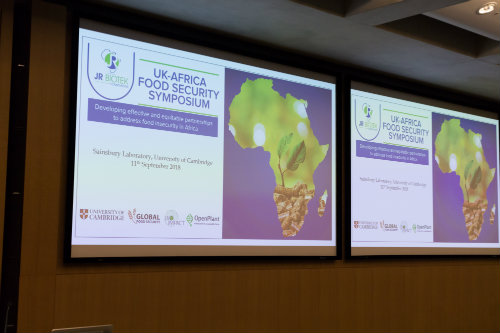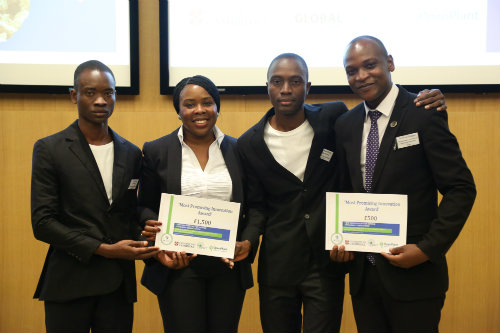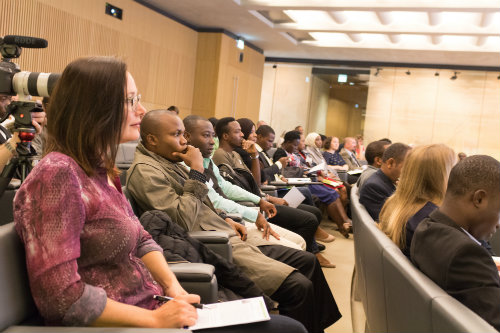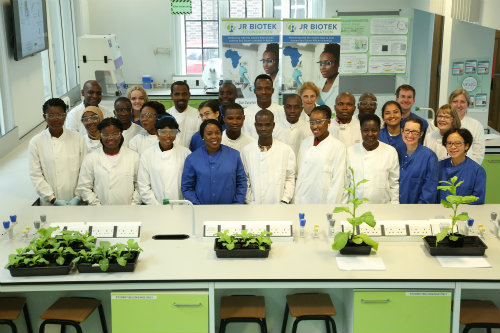
Submitted by Administrator on Tue, 18/09/2018 - 11:34
The symposium took place at the Sainsbury Laboratory, University of Cambridge on 11 September and brought together participants with diverse backgrounds, from plant biologists to social scientists.
The theme of the event was “Developing effective and equitable research partnerships to address food insecurity in Africa”, with an excellent keynote speech from Dr Debisi Araba, the Regional Director of the International Center for Tropical Agriculture in Nairobi, Kenya. The two panel discussions addressing research partnerships and food security in Africa, as well as capacity building in African tertiary education institutions, provided a great opportunity both for the invited panellists to give inspiring presentations on their work on the topics, and for the audience to give their views and ask questions. This created very lively discussion on the challenges contributing to food insecurity in African countries, but also on the opportunities that are there to tackle the problems.

The day’s official programme finished with the Bio-innovation for Africa pitching competition where individuals and teams of African PhD students presented their business/start-up ideas that were all designed to find solutions to the problems faced on the continent. The contestants of the competition were all participants in the hands-on scientific laboratory training workshop that was hosted at the Department of Plant Sciences the week before the symposium. The judging panel, led by Dr Belinda Clarke, Director of Agri-Tech East, thought that all the pitched business ideas had potential and were very enthusiastically presented. The winning team won a prize of £1,500 for their sustainably produced seeds enterprise EcoSeed, which the two PhD students from Benin had started with money they had saved from their scholarships.

The symposium, as well as the laboratory training for African PhD students, was organised by JR Biotek Foundation, which is a non-profit organisation aiming to help build capacity of African researchers and to promote joined up thinking on Africa’s sustainable development. The Foundation was founded by Carol Ibe, who is a PhD student and Gates Scholar at the Department of Plant Sciences at University of Cambridge, and a member of Cambridge Global Food Security initiative. Cambridge Global Food Security was one of the sponsors of the event.

A debriefing roundtable meeting was held the day after the symposium. It involved the organising team (JR Biotek Foundation) and PhD scholars from Africa who worked as a team to summarise the key challenges highlighted during the symposium as well as from their own experiences. The session ended with proposed solutions on how food and nutrition insecurity in Africa can be effectively tackled through regional and international partnerships. “A point echoed by the group was that any effort aiming to improve food and nutrition security or other development challenges in Africa must include a plan to build capacity of African researchers, especially in tertiary education institutions because that is the only way to ensure that the continent has enough scientists to tackle its own problems,” says Carol Ibe.

Carol and her team consisting of colleagues at the Department of Plant Sciences are very happy with the success of the symposium. According to Carol, “my team and I are very excited about the success of the UK-Africa Food Security Symposium, which provided a unique interdisciplinary platform for knowledge exchange, relationship building and formation of potential new collaborations to tackle food insecurity in Africa. I am particularly thrilled about the success of the ‘Bio-innovation for Africa’ pitching competition, which I created to encourage Africa-based research scientists, academics and students to become more proactive in finding solutions to the problems faced on their continent. We will continue to work with the winning and other teams (with promising ideas) to launch their start-ups, which will provide tremendous benefits to smallholder farmers and rural communities in Africa.”
Carol Ibe is a member of Cambridge Global Food Security. Visit her member profile here.

